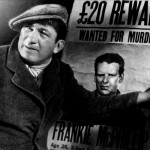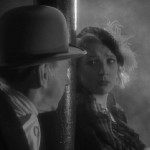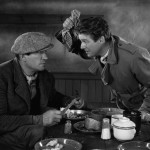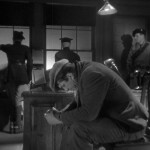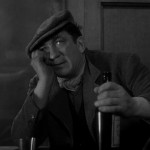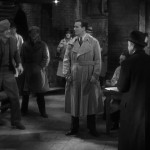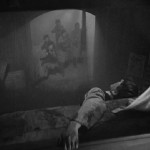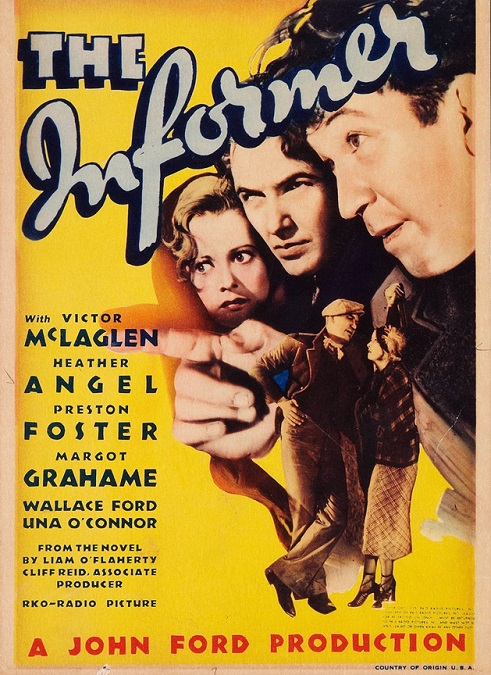
The Informer – 1935
At first, I wasn’t terribly impressed by The Informer. It struck me as a trite little film that was trying too hard to be dramatic. The result was an oppressive and dark movie with horror movie music and maudlin over-acting. But then I watched a short documentary about the film that was included on the DVD. This little feature helped me to understand what I had just watched, making me aware of what the movie was trying to do. My respect for the film and the way it was made went up several notches.
The main theme of the movie is the personal consequences of betrayal. It follows the journey of a man who shows a weakness of spirit and betrays his friend. The parallels to the biblical figure of Judas and his betrayal of Jesus are, at the very beginning of the movie, pointed out with a bible verse being shown on the screen. It references the thirty pieces of silver, the blood money given to the betrayer.
The movie boasted no big names. It was a British film that had a story based in Dublin, Ireland. The whole thing took place over the course of one night. Gypo, played by Victor McLaglan, is a big strong man who has been kicked out of the IRA, to his great shame and disappointment. He isn’t a very smart man. In fact, at times he is a drunkard who proves himself to be a bit slow. He is easily confused and consistently makes bad decisions.
Margot Grahame plays his prostitute girlfriend, Katie Madden. She is a woman who has led a hard life. She truly does love Gypo, though, and goes out of her way to help him whenever he needs it. Grahame actually stood out to me as a fine actress.
Gypo’s problems start when he sees a poster offering a reward of £20 for information leading to the capture of IRA member Frankie McPhillip, played by Wallace Ford. I’m actually surprised that they didn’t make the reward amount to be £30 to further parallel with Judas. Ford did a very good job, although his character was killed off after Gypo told the British police where he could be found. Frankie’s sister, Mary, played by Heather Angel, and his mother Mrs. McPhillip, played by Una O’connor, who I remember from the Best Picture winner Cavalcade, watched in horror as he shot a police officer before they gunned him down.
The rest of the film follows Gypo’s emotional journey as he comes to terms with his betrayal. IRA officer Dan Gallagher, played by Preston Foster, who also happens to be Mary McPhillip’s love interest, heads an investigation that leads to a famous trial scene. In this scene, Gypo breaks down and confesses to being the informer. It was probably this scene which showed the Academy that McLaglen was worthy of the Best Actor award.
But I think the real star of the film had to be the director, John Ford. The documentary feature explained how the film was very innovative for its time. Noted specifically for the film’s use of lighting and shadows to create a dark and oppressive feel, Ford was honored with the Best Director award. It was actually an incredibly well shot film. The outdoor scenes were always foggy which made for a permanently mysterious and creepy atmosphere. The glowing street lamps gave everything an ethereal look.
There were shots that were back-lit so that only a character’s silhouette could be seen, creating a sense of surrealism. Whispered conversations took place where the conspirators’ faces were mostly in shadow. Moving camera sweeps gave some shots the feeling of depth. Add to all that a haunting musical score that drew you into the dread and doom of the plot, and you have a powerful film that tells rather dark and weighty story. Max Steiner also won the award for Best Music (Scoring).
I liked the movie well enough before understanding just how impressively innovative it was, but after watching the documentary, I began to realize that I was not giving it enough credit for its achievements. It lost the Best Picture award to Mutiny on the Bounty, which had its own merits, though I am pleased to say that this one was definitely worthy of the nomination it received.
